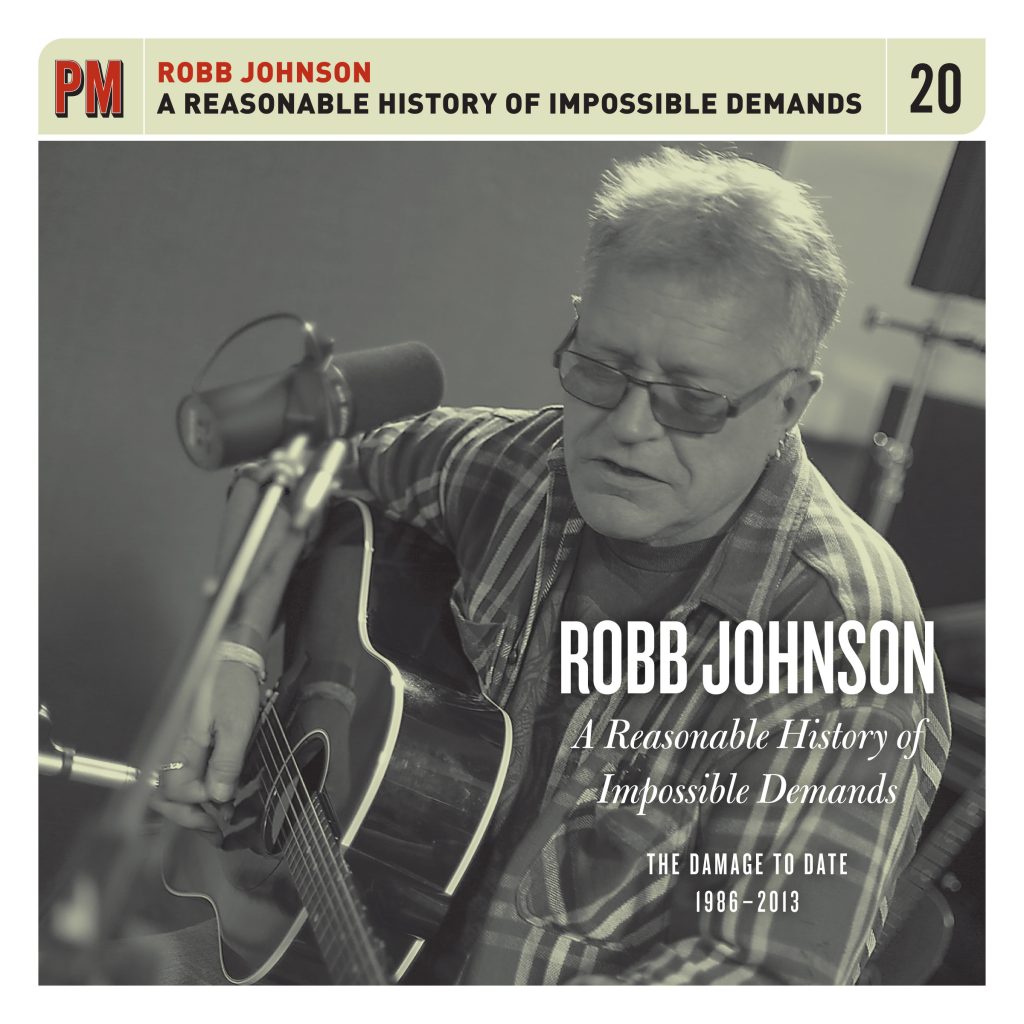By David Kidman
FATEA
March 2016
It’s just half a dozen years since Uncle Robb celebrated his standing as one of the UK’s leading writers of protest song with a copious four-disc box-set Margaret Thatcher – My Part In Her Downfall, which provided nothing less than a whistle-stop (or should I say whistle-blower’s) tour through two decades of saying Stop The War – and so much more. It exhumed a generous assortment of obscure, limited-edition and/or wilfully unavailable releases, and enshrined them for posterity on CD format. But the “Thatch” set was but the tip of the iceberg of Robb’s œuvre, not least in its concentration on just that one strand of his creativity. Now, as if to redress the balance and show that he’s capable of writing so much more than a decent protest-song (or fifty!), Robb’s lit the torch under the iceberg and put together this massive, magnificent five-disc “retrospective”, after hearing which nobody with an ounce of sanity or right-thinking moral fibre can refuse to acknowledge the breadth of – and high degree of literacy in – his songwriting – not just in the realm of outright protest (while still recognising the place that agit-prop commands at the hard core of his output). It’s become all too easy to forget just how many great (yes, I mean that!) songs Robb’s written – and even this exhaustive new retrospective can barely scratch the surface of the work of this enviably prolific songwriter; but it’s a salutary reminder for sure.
While
broadening the temporal scope of this new collection to span the full
27 years of his recorded career to date, Robb has also helpfully – if
“irregularly” chronologically – grouped the contents of each abundantly
well-filled disc according to a theme of sorts. Recordings are sourced
from releases both official and unofficial, all manner of formats,
originals and re-recordings, and it’s good that Robb has something of an
anorak’s attention to detail when it comes to furnishing discographical
and recording information within his frank and accessibly opinionated
booklet notes. In terms of bold statistics, around a dozen tracks are
culled straight from the above-mentioned Thatch set, while (that set
apart), only a handful come from releases that are still available. Many
songs are represented in versions taken from limited-edition or obscure
issues. There’s 10 previously unreleased tracks – some being alternate
versions or suchlike – and half-a-dozen more that are previously not
officially released (OK, now that might be splitting hairs!). Since a
significant majority of Robb’s releases are now deleted, this set will
be deemed a treasure trove even for those RJ fans who “have everything”,
and worth purchasing for the satisfyingly high proportion of
unavailable-elsewhere recordings.
The first disc introduces us to
Robb via the “early years” of 1987 to 1994, the first “key stage” of his
career if you like (cue laboured teaching reference!) – well, nothing
happens overnight does it?… Around two-thirds of Disc 1’s recordings are
sourced from CDs Robb made with Pip Collings, during the “folk-friendly
duo” phase. And both within and outwith that category, a large number
of these early songs have attained a kind of unofficial “greatest hit”
status for Robb. The most-oft-quoted example is Rosa’s Lovely Daughters,
of course (here presented in Robb’s chunky banjo-driven rendition from
the 1987 Skewed, Slewed, Stewed & Awkward LP), but I’d also cite
More Than Enough, I Close My Eyes, Fairy Tales In Feltham, Winter Turns
To Spring, and of course there’s the towering achievement that is
Overnight. This first disc also contains what might be regarded as the
first of his classic “English chansons” Sunday Morning St. Denis and the
reflective The Last Time I Saw Paris, as well as 6B Go Swimming (one of
Robb’s acutely-observed “skool songs”), the “idealised England” of
Evergreen, the observation of real natural beauty (Blame The Snow For
Falling) and the terrifically poignant You Don’t Have To Say Goodbye.
Now (as has been remarked), these are songs to play to those who “don’t
like Robb on principle”!…
The second disc is the most inevitable entry in the song catalogue: subtitled Protest And Survive, it delivers a quarter-century’s worth of Robb’s contributions to the genre, but not necessarily all of the most obvious candidates. The disc opener, for instance – the obscure A Bird Is Singing (which I took into my own repertoire over a decade ago) – may well be the roughest track in terms of both recording and singing, but its simple lyric still packs a forceful punch. As indeed does each and every one of the specimens of protest song here enshrined, for all that in some cases (as Robb admits) some degree of punk-rock edge may be sacrificed for listenability by dint of including later re-recordings rather than original takes. Naturally, some of these songs have polarised even Robb’s admirers – but however blunt the weapon, the point is always well made and the menu still contains some plenty of prime cuts for certain, from the National Union Of Seafarers strike-fundraiser The Herald Of Free Enterprise; the gleefully grisly “alternative” kiddies’ singalong Animals Song; two unexpectedly controversial songs Vic Williams (song of a contemporary deserter) and Three Minute Silence; and the anthemic Red And Green and Undefeated; to the outright upfront sentiments of We All Said Stop The War and the previously unreleased Ding Dong Thatch and This Is What Democracy Looks Like. The disc also accords due prominence to the highly-rated Inexcusable and the true story of Alice Annie Wheeldon, and the glorious celebratory noise of Punk Rock Jubilee (play this one LOUD and set on repeat!!), and unearths gems like a YouTube take on When Saturday Came and a storming electric-band version of North West Frontier.
Disc 3 presents English Chansons 1995-2003, an integral
strand of Robb’s writing that’s enjoyed an increasingly high profile
over the years. In his notes, Robb admits that a number of these songs
are trying to come to terms with the fact that he doesn’t actually live
in Paris. He has a long-term love affair with the city, sure, but each
of these little masterpieces also displays his maximum respect for, and
empathy with, the great writers of chanson, their tradition and their
methods. These songs deal with relationships, of person and place, in
language that’s realistic, often conversational, invariably poetic,
always literate. . So many of these songs still possess the capacity to
make me weep; while it’s tribute enough to the sheer quality of these
chansons when you learn of the critical acclaim they’ve received, not to
mention the eagerness of singers of stature like Barb Jungr to cover
them. The disc contains just two songs from the classic “cjohnsong”
collection The Night Café, as well as the lovely dobro-accompanied Love
Takes No Prisoners, three contrasted examples from 21st century Blues,
and – glory be! – five from 1999’s The Big Wheel, including Au Depart,
one of my own personal favourites from Robb’s extensive recorded
catalogue. There’s also a rare RJ3 version of Invisible People, and two
songs from the honest-to-goodness, modestly titled A Beginner’s Guide
album (including Breakfast In Chemnitz – which incidentally is the only
song to be missing a paragraph in the booklet notes…), and the disc
closes on a poignant note with an unreleased song, Magic. Quite.
Disc
4 presents a diverse collection of songs instancing “the enduring if
irregular racket”, kicking off with two choice cuts that were most
widely available on the This Is The UK Talking compilation including Not
In My Name, a particularly enduring example originally written in 1991
to protest against Gulf War 1. There’s a number of other songs whose
relevance has endured into different decades, while they’ve also
survived with or benefitted from different treatments or arrangements.
Robb’s always careful to select a version which he feels to have more
edge or power, or where the recording circumstances were special or
specially memorable. The enduring influence of Paris pervades You And
This City, Hands Off My Friends comes from the Article 14 benefit CD.
Other important songs here include I Am Not At War, UK Talking, Ugly
Town and Karl Marx City Blues. Many are given in more fully-scored
contexts, but perhaps the only song which falls victim to
over-arrangement is Lottery Land.
Disc 5 enjoys a meaningfully double-edged sub-title, Same Sh**, Different Day. For these songs contain situations, circumstances and experiences good and bad, sometimes both at once. In a way, it’s the most difficult disc to come to terms with, for we all feel similarly ambivalent about life in the 21st century after all. In fact, the songs collected together for this final disc are less depressing than the obvious “plus ça change” interpretation might imply – many are decidedly positive statements and indeed are often quietly celebratory. Robb’s genius for observation of things that matter runs through these songs like a stick of Brighton rock. True stories form the basis for The Rottweiler Man, Real Cool Purple Shirt and (arguably finest of all) Stand Clear!, while Pennypot Lane and the tender Here Comes That Miracle Again both find their inspiration in thoughtful reflection on simple pleasures. The barbed A Place In The Country resulted from a family outing, while the prescient The Wrong Train is one of a pair of songs stemming from actual dreams. The wonderful Metro album, on which Robb was accompanied by pianist Russel Churney, is allocated four contrasted tracks, including standout chanson Don’t Close The Bar and the jaunty authentically-cockney music-hall-style number The London Eye. Tucked in there towards the end of the disc, we find the sparsely voiced No Time To Say Goodbye, a commentary on the personal “sharp end” of the “collateral damage” of warfare: evidently a painfully difficult song to both write and sing, and recorded and released here for the first time. The theme of solidarity is of course the central concept for much of Robb’s writing, and Be Reasonable – from which the set’s title concept is derived – is an obvious choice for inclusion on this final disc – here in the “massed folksingers” version from the 2012 Anti-Capitalist Roadshow double album. For this is what we get in this mammoth 6½-hour collection of Robb’s work – justice and poetry, and jam on it too!
Now subtitled The Damage To Date, the set was originally going to be called Leaving The 20th Century – but that would have made it sound unduly valedictory I guess, for the overall impact is more in tune with the uplift and the sense of shared humanity that the songs bring. All human life is here – well, almost (there could’ve been songs about football, another of Robb’s passions, while Robb’s Great-War-themed songs, largely based on his granddad’s experiences, are also unrepresented on this set). Robb says things that need saying, however unpalatable, and he does this so eloquently. This is after all a very reasonable history – and a very reasonably priced collection that will make no impossible demands on your pocket.







